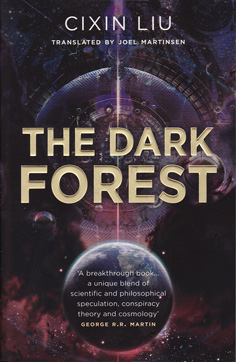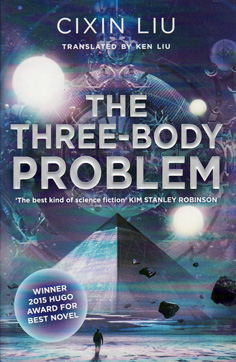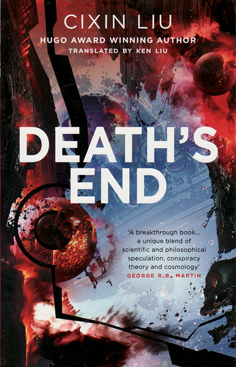

地球往事 (The Remembrance of Earth's Past Trilogy): 2
Translator: Joel Martinsen
- Category:Science Fiction
- Date Read:16 August 2017
- Pages:550
- Published:2008 (Chinese original version) 2015, (English Translation)

It’s commonplace for publishers to print favourable reviews on the covers of their books to attract more sales. On the back cover of my copy of 黑暗森林 (The Dark Forest) Kim Stanley Robinson is quoted: The best kind of science fiction
he states. One might quibble and say that the praise is self-serving, since Robinson’s own books are of a similar scientific genre to Liu’s work: Robinson takes what is possible or probable, projects into the future (usually) and considers how technology and what it offers may shape a brighter future for humanity. Robinson’s own 2312 plays with the possibilities of quantum computers and an inhabited Solar system while Aurora explores what living in deep space might be like on a journey to the stars. Robinson’s brand of ‘hard’ science fiction is Utopian in its bent while 刘慈欣 (Cixin Liu) seems more interested in exploring the psychology of civilisation and its technological achievements. As Luo Ji, the protagonist of this second novel in the series, tells Keiko Yamasuki:
The outcome of natural biological evolution requires at least twenty thousand years to manifest itself, but human civilisation has just five-thousand years of history, and modern technological civilisation just two hundred. That means that the study of modern science today is being done by the brain of primitive man. (142)
The limitations of human thought and technology are central to the plot of The Dark Forest. Having contacted the Trisolarans in The Three-Body Problem, the human race has 400 years before it potentially faces annihilation from an alien civilisation intent on taking the Earth. Earth not only faces the challenge of technologically advancing to meet this challenge, given that the Trisolarans have made it impossible to advance Earth’s science due to the sophons, particles that both interfere with the results of super colliders and act as unseen spies for the Trisolarans, but humanity must also struggle with its own evolutionary inheritance.
The implication of the sophons’ presence is paramount to humanity’s plans. While technology can only be developed to the logical ends of current knowledge, it is also almost impossible to keep humanity’s preparations secret from the Trisolarans. This is the justification for a radical plan, the Wallfacer Project. Four men are selected from the sciences and military to develop secret plans to repel the invasion. They are given access to extraordinary resources and are not required to justify their decisions. In order for Earth to achieve some level of secrecy, and thereby some hope that it might prevail, its plans can only be entrusted to the privacy of individual brains.
However, it is the rise of individualism, witnessed in the 20th century after World War II, that is perceived as part of the problem facing humanity: We have four hundred years. In the past, human society used exactly that amount of time to evolve from the era of collective heroism to one of individualism, so why can’t we use the same amount of time to evolve back?
Wallbreaker Tyler asks Zhang Beihai, a soldier who identifies humanity’s real weakness: Defeatism. Defeatism is closely associated with Escapism, the desire of some to flee Earth and strike out into space in a last-ditch effort to preserve the species.
This book is enormously satisfying. There is much to think about, but Liu’s philosophising is also tied to a great plot. Robinson, in comparison, is less concerned about plot and is content to immerse his readers in his worlds and their implications. Liu’s novel tends to be darker than Robinson, too. Robinson’s stories are a long march to stability and equilibrium, while Liu focusses upon the limits of humanity and its civilisation which give a darker reality to his story.
The book is broadly divided into two sections. The first section covers our present period before Luo Ji, the fourth wallfacer selected, enters a hibernation state and is awoken two hundred years in the future. While the efforts of the four wallfacers (and their human adversaries, the wallbreakers, intent on revealing their plans to humanity and the Trisolarians) is fascinating, the second part of the story draws us into a vision of the future shaped by the long threat of invasion, and the psychological and sociological impacts of that. Not only that, but the plans of humanity and their outcomes are a great payoff for the reader. The second half of the story is gripping and intriguing for its action and its ideas.
Central to all this is the two axioms established by Ye Wenjie for Luo Ji in the prologue of the novel. Like Asimov’s three laws governing robots, Ye’s axioms are both simple and far reaching:
First: Survival is the primary need of civilisation. Second: Civilisation continuously grows and expands, but the total matter of the universe remains constant.
These axioms underpin the foundation of ‘cosmic sociology’ which Ye introduces to Luo Ji. Without giving anything away, it is these axioms which reveal the nature of the dark forest, a concept chilling in its implications for humanity’s survival, as well as its implications for the ideals human beings hold as part of their own humanity. Where Robinson sees hope in the future, even in adverse conditions and situations, due to the ingenuity and resilience of the human race, Liu is more interested in teasing out the consequences for what theists might call our very souls. The book opens with an ant crawling across the surface of a gravestone, an environment of which it has no understanding, much like humanity in its vast universe. But just as the ant is a metaphor for human ignorance, the alien presence is also a metaphor for the darker psychological and sociological problems faced by humanity.
This is a book that works on many levels and is very satisfying. While many of its characters enter and leave the story without much development, its central characters like Luo Ji and Zhang Beihai are well developed and psychologically real creations. The plot moves quickly after the Wallfacer project is introduced. Liu is comfortable extending the story beyond the initial parameters of The Three-Body Problem. I even think this book is both more entertaining and thoughtful than the original, and I thought that book was an excellent example of this kind of science fiction. I have yet to start 死神永生 (Death’s End), but I anticipate another good story. I would highly recommend the first two books in the trilogy.



No one has commented yet. Be the first!